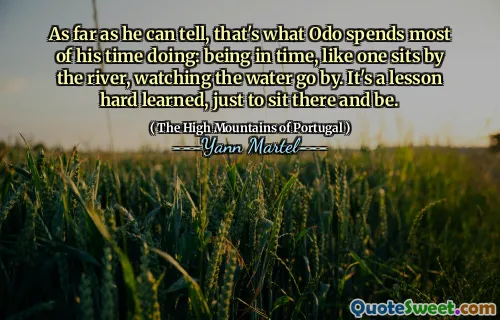"The High Mountains of Portugal" is a novel by Yann Martel that intertwines the stories of three different characters across time, all linked by the themes of loss, love, and the search for meaning. The narrative begins in the early 20th century with a Pathologist named Teodoro who becomes fascinated with a mystical artifact. His journey leads him to the mountains of Portugal, where he faces existential questions and grapples with his grief after a personal tragedy.
The second part of the book shifts to the 1930s, featuring a woman named Florence and her romantic entanglement with a man who is also dealing with loss. Through her story, Martel explores the concept of faith and the connection between humans and the divine, set against the backdrop of the country's breathtaking landscapes.
The final segment takes place in the 1980s, focusing on a man named Eusebio who embarks on a road trip with a strange encounter. This part of the story delves into the themes of identity and belonging, culminating in an exploration of how the past impacts the present. Overall, the novel presents a rich tapestry of human experience intertwined with philosophical reflections and the beauty of Portugal's mountains.
More »
Today Birthdays
1896 -
John Dos Passos
1960 -
Edward St Aubyn
1925 -
Yukio Mishima
1875 -
Albert Schweitzer
1919 -
Andy Rooney
1952 -
Maureen Dowd
1957 -
Anchee Min
1969 -
Dave Grohl
1988 -
Tom Rosenthal
1913 -
Tillie Olsen
1949 -
Lawrence Kasdan
1920 -
George Herman
1801 -
Jane Welsh Carlyle
1969 -
Jason Bateman
1892 -
Hal Roach
1941 -
Faye Dunaway
1968 -
LL Cool J
1982 -
Aaron Koblin
1943 -
Shannon Lucid
1940 -
Trevor Nunn
1942 -
Carol Bellamy
1978 -
Kuno Becker
1977 -
Yandel
1948 -
Carl Weathers
1947 -
Bev Perdue
1981 -
Trieste Kelly Dunn
